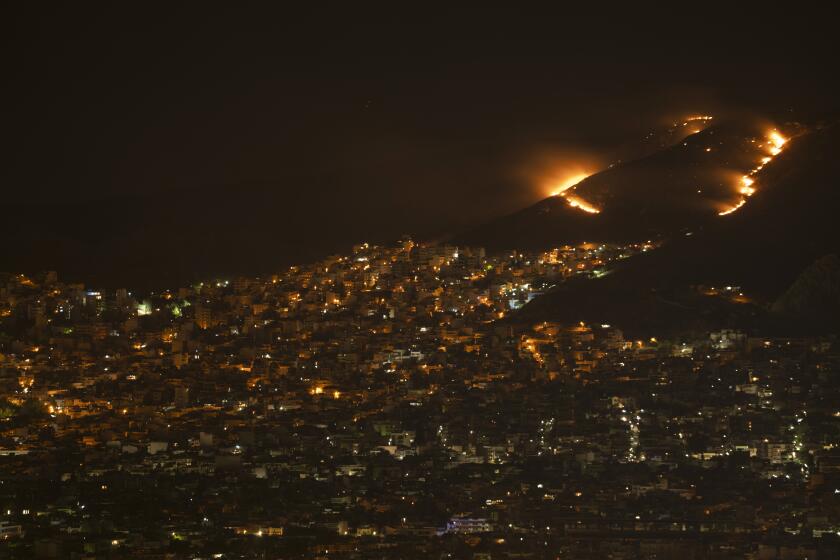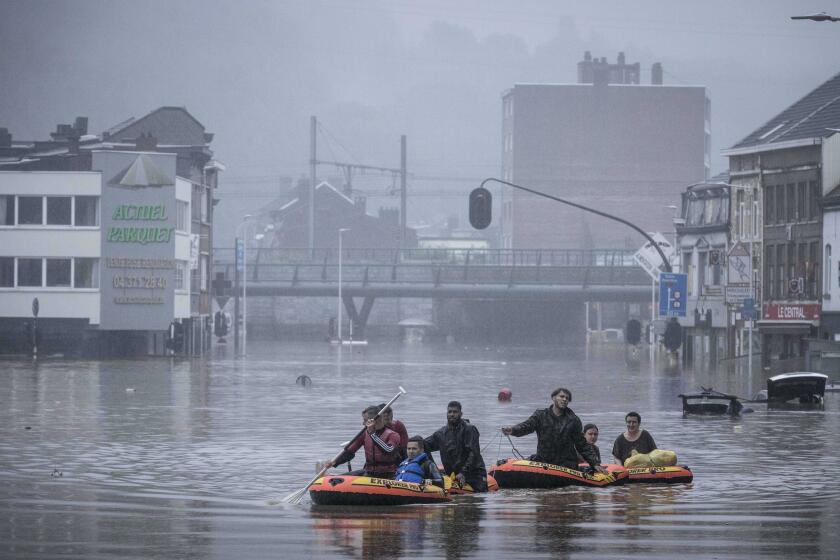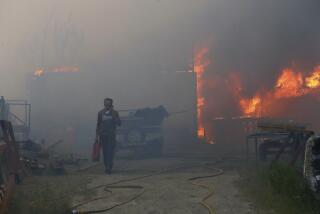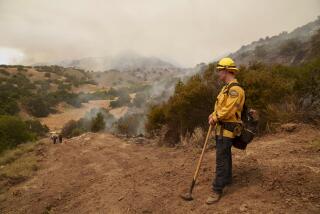Wildfires scorch parts of Europe amid extreme heat wave
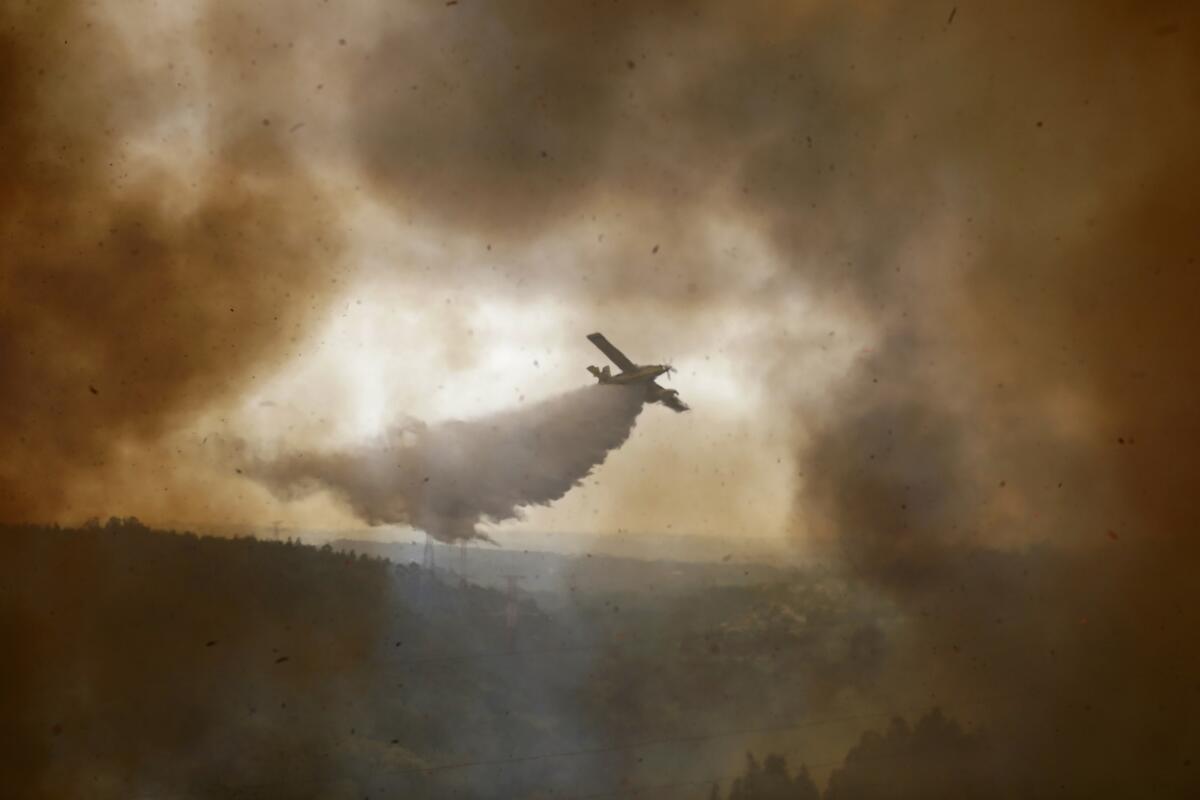
- Share via
LISBON, Portugal — A spate of wildfires is scorching parts of Europe, with firefighters battling blazes in Portugal, Spain, Croatia and southern France on Wednesday amid an unusual heat wave that is being linked to climate change.
In Portugal, Civil Protection commander André Fernandes said multiple fires have caused the evacuation of more than 600 people. About 120 people needed medical treatment, with two people — one civilian and one firefighter — suffering serious injuries, Fernandes said.
Water-dropping planes helped 1,300 firefighters combat the worst of the blazes in the nation’s interior, while an additional 1,000 worked to bring other fires under control.
The European heat wave is also sparking flames in Spain and France — and in Turkey at the other end of the Mediterranean.
More than 800 firefighters battled two wildfires outside Bordeaux in southwestern France, according to the regional emergency service. The fires began Tuesday near the towns of Landiras and La Teste-de-Buch, and were still burning Wednesday morning.
About 6,500 people have been evacuated from campgrounds and villages in the forested area. The number of injuries is unclear. The two fires have destroyed more than 4,400 acres of terrain, the emergency service said.
Extended drought conditions have already hit European nations such as Greece and Italy, and a heat wave last month went as far up as northern Germany.
Images from firefighters showed wind-whipped flames racing through thickets of trees and grassland and smoke blackening the horizon.
The regional administration banned activity in forested areas at risk. Several regions in southern France are on alert because of hot, dry weather and high winds. Wildfires swept through the Gard region in southeastern France last week.
Portugal has a history of fatal forest fires. In 2017, wildfires killed more than 100 people. No one has died from a wildfire since then as Portugal improved its forest management and firefighting strategies.
Last year, Portugal recorded its lowest number of wildfires since 2011. But a mass of hot and dry air blown in by African winds is driving temperatures in the Iberian Peninsula beyond their usual highs.
The Atlantic country, which has been on alert for wildfires since last week, is sweltering under a spike in temperatures that are forecast to reach 115 degrees in the central Alentejo region on Wednesday and Thursday. Authorities said 96% of the country was classified at the end of June as being in either “extreme” or “severe” drought.
The European Union’s 27 member countries have reached a deal to eliminate carbon emissions from new cars by 2035 following hard-fought talks.
More than 7,400 acres had been consumed just in the district of Leiria, north of Lisbon, Mayor Goncalo Lopes told Portuguese state broadcaster RTP.
Portuguese Prime Minister António Costa, who canceled a trip abroad to deal with the emergency, said that better care of woodlands and abandoned farmland was key to protecting them.
“In 2017 the country realized that having enough firefighters is essential, but it is not enough,” Costa said. “We have to get to the root of the problem.... The abandonment of property and its non-management is one of the biggest risk factors for forest fires.”
Neighboring Spain hit highs of 109 degrees in several southern cities on Tuesday.
Politicians and weather forecasters have been shocked at the ferocity of the precipitation that caused deadly flash flooding in Western Europe.
More than 400 people were evacuated on Tuesday because of a wildfire that had consumed 8,600 acres in western Spain.
Fueled by strong winds, fires raged along Croatia’s Adriatic Sea coast as well, with the most dramatic situation reported near the town of Sibenik, where water-dropping planes and dozens of firefighters struggled to contain the flames that briefly engulfed some cars and a church tower. Regional N1 television reported that some residents evacuated in rubber boats. Fires were also reported near the coastal town of Zadar.
Firefighter Boris Dukić told state HRT television that “it’s hell, we don’t know where to go first.”
European Union officials issued a warning last week that climate change is behind the extremely dry and hot summer so far on the continent, urging local authorities to brace for wildfires.
Cayetano Torres, spokesman for Spain’s national weather forecaster, said that the “unusual” heat wave and lack of rainfall in recent months has created ideal circumstances for fires.
“These are perfect conditions for the propagation of fires, which, when you add to that some wind, you have have guaranteed propagation,” he said.
In southwestern Turkey, a blaze that erupted close to the village of Mesudiye, near the Aegean Sea resort of Datca, was moving toward some homes in the area, according to the provincial governor’s office. It said at least nine water-dropping helicopters and five planes were deployed to battle the fire.
Last summer, blazes that were fed by strong winds and scorching temperatures tore through forests in Turkey’s Mediterranean and Aegean regions. The wildfires, which killed at least eight people and countless animals, were described as the worst in Turkey’s history.
President Recep Tayyip Erdogan’s government came under criticism for its inadequate response and preparedness to fight large-scale wildfires, including a lack of modern firefighting planes.
More to Read
Sign up for Essential California
The most important California stories and recommendations in your inbox every morning.
You may occasionally receive promotional content from the Los Angeles Times.
